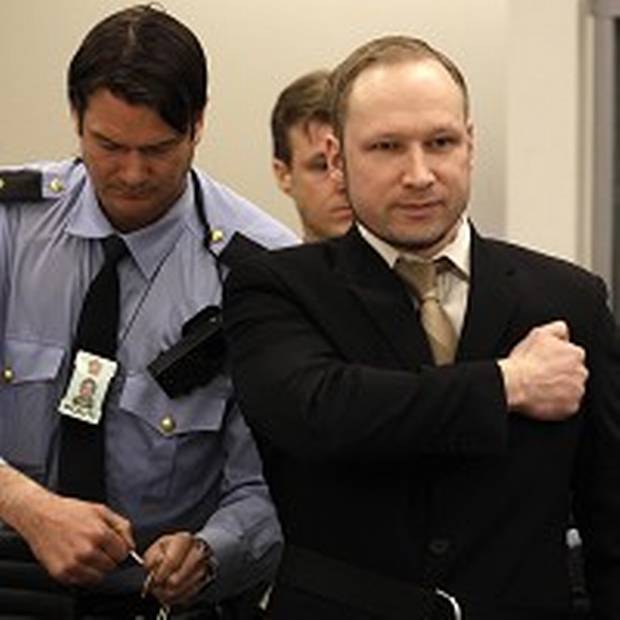Anders Breivik pleaded not guilty at Norway massacre trial
Anders Behring Breivik, the man who carried out bomb and gun attacks in Norway last year which left 77 people dead, has pleaded not guilty at the start of his trial in Oslo.
Anders Breivik, 33 attacked a youth camp organized by the governing Labour party on the island of Utoeya, after setting off a car bomb in the capital.
He told the court he “acknowledged” the acts committed, but said he did not accept criminal responsibility.
The prosecution earlier gave a detailed account of how each person was killed.
If the court decides he is criminally insane, he will be committed to psychiatric care; if he is judged to be mentally stable, he will be jailed.
In the latter case, Anders Breivik faces a sentence of 21 years, which could be extended to keep him behind bars for the rest of his life.
He was found insane in one examination, while a second assessment made public last week found him mentally competent.
Dressed in a dark suit, Anders Breivik smiled as he entered the courtroom and a guard removed his handcuffs. He then gave a closed-fist salute.
He later told the lead judge, Wenche Elisabeth Arntzen: “I do not recognize the Norwegian courts. You have received your mandate from political parties which support multiculturalism.”
He also said he did not recognize the authority of Judge Arntzen, claiming she was friends with the sister of former Prime Minister and Labour party leader Gro Harlem Brundtland.
The judge noted the objections, which Anders Breivik’s lawyer said were not official, and said the defense could follow up on them in their opening arguments.
Anders Breivik described his occupation as a “writer”, currently working from prison.
Prosecutor Inga Bejer Engh read out the charges against him and gave an extensively detailed account of how each person was killed or injured in last year’s attacks.
The prosecutor said the attacks “created fear in the Norwegian population”, adding: “The defendant has committed very serious crimes, on a scale which hasn’t been experienced in our country in modern times.”
Anders Breivik showed no emotion, looking down at the table in front of him.
At the end of the indictment, he told the court: “I acknowledge the acts, but not criminal guilt – I claim I was doing it in self-defense.”
Anders Breivik has already confessed to the attacks on 22 July. In the car bombing outside government buildings in Oslo, eight people were killed and 209 wounded.
He killed 67 people and wounded 33 – most of them teenagers – in his shooting spree at the youth camp on Utoeya. A further two people died by falling or drowning.
At a court hearing in February, Anders Breivik said his killing spree was “a preventative attack against state traitors”, who were guilty of “ethnic cleansing” because they supported a multicultural society.
His lawyer has said his only regret is that “he did not go further”.
“It is difficult to understand, but I am telling you this to prepare people for his testimony,” Geir Lippestad told reporters before the trial.
Investigators have found no evidence to support Anders Breivik’s claims that he belonged to a secret “resistance” movement, the “Knights Templar”, named after a military and religious order founded during the Crusades to fight the enemies of Christendom.
“In our opinion such a network does not exist,” prosecutor Svein Holden told the court on Monday.
A 12-minute-long film about the evils of “multiculturalism” and “Islamic demographic warfare”, which Breivik posted online on the day of the attacks, was shown in court before the trial was adjourned for lunch. As it concluded, he could be seen wiping tears from his eyes.
Later, previously unreleased surveillance footage of the Oslo bombing was shown.
Some of the survivors and relatives of those killed reportedly gasped after footage was played of Anders Breivik’s explosives-packed vehicle exploding, followed by scenes of panic as people fled and pieces of metal fell to the ground. But the defendant was impassive, and at times even smirked.
The court later adjourned for the day.
At a news conference following the adjournment, Geir Lippestad said Anders Breivik considered he was at war and therefore felt he should be tried by “a war tribunal”.
Asked about Anders Breivik’s tears during the first day, he said “part of the explanation” might be that his client considered his actions “necessary to prevent a war in Europe”.
Parts of the trial will be shown on television, but the court will not allow Anders Breivik’s testimony or that of his witnesses to be broadcast. Anders Breivik is scheduled to take the stand for about a week, starting on Tuesday.
With Anders Breivik not expected to express any remorse for his actions, his trial promises to be an ordeal for the families of those killed and for those who survived.
Jorid Nordmelan, a survivor of the Utoeya massacre, said she would be in court to hear Anders Breivik testify.
“It’s a historical date for Norwegians,” she said.
“We never had a trial like this, so we don’t know what’s going to happen.
“Prosecutors told me they were going to make the opening statements awful, so that people can just feel what he did right there.”
Police have sealed off streets around the courtroom, which was specially built for the trial to accommodate more than 200 people. Glass partitions have been put up to separate the victims and their families from Anders Breivik.
[youtube lGwRKY0NzKM]

